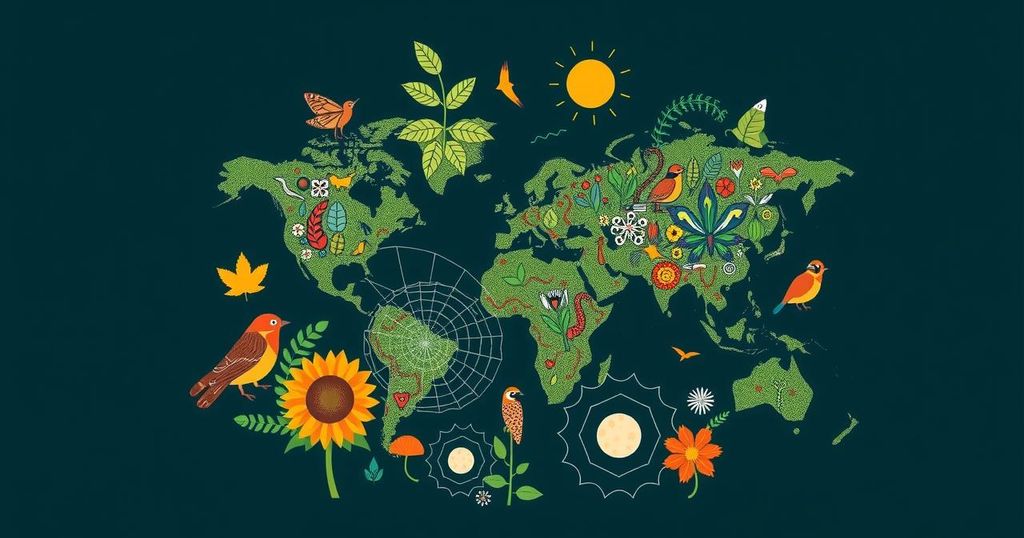Unified Action Needed on Biodiversity and Climate Change
The COP16 to the Convention on Biological Diversity will occur from 21 October to 1 November 2024 in Cali, Colombia. The International Fund for Animal Welfare (IFAW) is urging enhanced international collaboration to address biodiversity loss and climate change. The importance of a unified approach has been emphasized, and the COP16 is viewed as a pivotal moment for aligning efforts. IFAW will hold a side event focusing on wildlife conservation’s role in climate strategies.
The 16th Conference of the Parties (COP16) to the Convention on Biological Diversity (CBD) is set to take place from 21 October to 1 November 2024 in Cali, Colombia. As global leaders and environmental specialists convene for this significant event, the International Fund for Animal Welfare (IFAW) is advocating for robust international cooperation to address the pressing, intertwined crises of biodiversity loss and climate change. Matt Collis, Senior Director of Policy at IFAW, emphasized the necessity of an integrated approach, stating, “We cannot solve either the climate crisis or biodiversity loss without addressing the other. COP16 is a pivotal moment to ensure that national and international efforts to protect biodiversity and combat climate change work in tandem, laying the groundwork for the future.” This upcoming COP16 is particularly crucial as it marks the first of the closely linked Rio Convention COPs scheduled for 2024, setting a precedent for upcoming global environmental discussions. The subsequent United Nations Framework Convention on Climate Change (UNFCCC) COP30 will compel all nations to revise their strategies to confront climate change. The significance of a cohesive strategy has already been recognized in the 2023 COP28 Joint Statement on Climate, Nature, and People, which was endorsed by the leaders of the Rio Conventions and various international coalitions. IFAW urges that the principles outlined in this statement be incorporated into the concluding outcomes of COP16, including the high-level segment and the Cali Declaration. Moreover, the preservation of marine and coastal biodiversity is paramount, as these ecosystems are invaluable not only for wildlife but also for humanity. Healthy marine environments contribute to climate regulation by absorbing carbon and stabilizing climatic conditions. However, human activities and climate change pose a growing threat to these essential ecosystems. Matt Collis further remarked, “Healthy oceans are the foundation of a healthy planet. They absorb carbon, mitigate climate impacts, and support rich biodiversity. COP16 must prioritize the protection of marine ecosystems to ensure that they continue to provide these critical services in the face of escalating climate pressures.” Collis concluded with a hopeful message, stating, “Time is running out to tackle the intertwined crises of biodiversity loss and climate change, but COP16 offers hope. By ensuring that biodiversity and climate efforts are aligned at every level, we can make meaningful progress. The future of our planet depends on it.” In addition, IFAW will host an official side event entitled “Leveraging wildlife conservation and rewilding to supercharge climate mitigation and adaptation” on Thursday, October 24, at 16:30 PM COT, which will focus on the vital role of wildlife in combating climate change and will introduce new guidelines aimed at assisting governments in incorporating wildlife conservation into their climate strategies. Details are available at https://www.cbd.int/side-events/5723.
The significance of biodiversity and its relationship with climate change has become increasingly recognized in global environmental policy discussions. The UN Convention on Biological Diversity (CBD) is crucial for coordinating international efforts to protect biodiversity while addressing the overarching challenge of climate change. The upcoming COP16 is set to be a critical forum where leaders can unify their approaches. The interconnection of these crises requires coordinated action to effectively ensure sustainable development and environmental integrity. With the looming COP30 on climate change, COP16 serves as a timely platform for setting collaborative agendas that emphasize the interconnectedness of climate and biodiversity goals.
In conclusion, the COP16 Conference stands as a fundamental opportunity for international leaders to address the crucial challenges posed by biodiversity loss and climate change. The calls for unified action from organizations like IFAW underline the necessity of collaborative strategies that emphasize the mutual importance of these issues. The outcomes of COP16 will significantly influence the global strategy for environmental conservation and climate action in the years to come, particularly as nations prepare for the forthcoming COP30. As global representatives gather in Cali, it is essential to prioritize integrated solutions that support both biodiversity and climate resilience engagement.
Original Source: www.ifaw.org




Post Comment